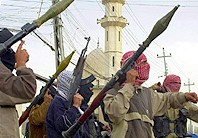Leaked U.S. Report: Insurgency financially self-sustaining
 BAGHDAD, Nov. 25 — The insurgency in Iraq is now self-sustaining financially, raising tens of millions of dollars a year from oil smuggling, kidnapping, counterfeiting, corrupt charities and other crimes that the Iraqi government and its American patrons have been largely unable to prevent, a classified United States government report has concluded.
BAGHDAD, Nov. 25 — The insurgency in Iraq is now self-sustaining financially, raising tens of millions of dollars a year from oil smuggling, kidnapping, counterfeiting, corrupt charities and other crimes that the Iraqi government and its American patrons have been largely unable to prevent, a classified United States government report has concluded.The report, obtained by The New York Times, estimates that groups responsible for many of the insurgent and terrorist attacks are raising $70 million to $200 million a year from illegal activities. It says that $25 million to $100 million of the total comes from oil smuggling and other criminal activity involving the state-owned oil industry aided by “corrupt and complicit” Iraqi officials.
As much as $36 million a year comes from ransoms paid to save hundreds of kidnap victims in Iraq, the report said. It estimates that unnamed foreign governments — previously identified by senior American officials as including France and Italy — paid Iraqi kidnappers $30 million in ransom last year.
A copy of the report was made available to The Times by American officials in Iraq, who said they acted in the belief that the findings could improve American understanding of the challenges the United States faces in Iraq.
The report offers little hope that much can be done, at least soon, to choke off insurgent revenues. For one thing, it acknowledges how little the American authorities in Iraq know — three and a half years after the invasion that toppled Saddam Hussein — about crucial aspects of insurgent operations. For another, it paints an almost despairing picture of the Iraqi government’s ability, or willingness, to take measures the report says will be necessary to tamp down the insurgency’s financing.
“If accurate,” the report says, its estimates indicate that these “sources of terrorist and insurgent finance within Iraq — independent of foreign sources — are currently sufficient to sustain the groups’ existence and operation.” To this, it adds what may be its most surprising conclusion: “In fact, if recent revenue and expense estimates are correct, terrorist and insurgent groups in Iraq may have surplus funds with which to support other terrorist organizations outside of Iraq.”
Some terrorism experts outside the government who were given an outline of the report by The Times, criticized it for a lack of precision and a reliance on speculation.
Completed in June, the report was compiled by an interagency working group that is investigating the financing of militant groups in Iraq.
A Bush administration official confirmed the group’s existence and said it is studying how money was moved into and around the country. He said the group, led by the National Security Council, drew its members from the C.I.A., the F.B.I., the Defense Intelligence Agency, the State Department, the Treasury Department, and the United States Army’s Central Command, which oversees the war in Iraq. The group of about a dozen, the official said, is led by Juan Zarate, deputy national security adviser for combating terrorism.
Read the rest at the NY Times

<< Home